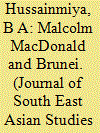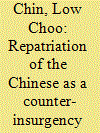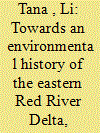|
|
|
Sort Order |
|
|
|
Items / Page
|
|
|
|
|
|
|
| Srl | Item |
| 1 |
ID:
141050


|
|
|
|
|
| Summary/Abstract |
This article narrates the long-standing diplomatic relationship between Malcolm MacDonald and Brunei. Macdonald played a significant role in safeguarding Brunei's survival as an independent Malay Islamic sultanate during decolonisation. He prevented Brunei from becoming a British crown colony in 1946 unlike the neighbouring states of Sarawak and North Borneo. Having failed to unite the three North Borneo territories into a federation, he may have concurred with Brunei's decision to opt out of the Malaysian Federation in August 1963 and thereafter. Due to his empathy with the Brunei sultans, especially Omar Ali Saifuddin the III, MacDonald's approach for Brunei's future contradicted the vision of his contemporaries for democratising Brunei.
|
|
|
|
|
|
|
|
|
|
|
|
|
|
|
|
| 2 |
ID:
141048


|
|
|
|
|
| Summary/Abstract |
This article considers the intricate entanglements of ritual, history and power by focusing on the recent rejuvenation of ritual practices pertaining to former kings as enacted in contemporary Huế, the former imperial capital of Việt Nam (1802–1945). It examines how the Nguyễn monarchs, who were previously repudiated by the early socialist regime, have been ritually reinstated as extraordinary ancestral figures and acknowledged as potent spirits to whom many turn for blessings. Drawing on ethnographic and historical material, the article traces changes in the locals' ritual engagements with the royal dead and pays attention to fluctuations in the posthumous fate of the Nguyễn royalty while highlighting the city's transformation from imperial capital to a tourist marketplace via the horrors of the battlefield.
|
|
|
|
|
|
|
|
|
|
|
|
|
|
|
|
| 3 |
ID:
141049


|
|
|
|
|
| Summary/Abstract |
During the Malayan Emergency, British High Commissioner Henry Gurney pushed the policy of repatriating to China thousands of ‘alien’ Chinese detainees suspected of supporting the Malayan Communist Party's guerrilla war. This article traces the stages of this controversial policy, which, despite obstacles, remained a key counter-insurgency strategy until 1953. But the policy ignored the civil war in China and risked jeopardising Sino–British relations. When China closed its ports, the British administration put forth more desperate proposals to continue repatriation, often in the face of Foreign Office objections, ranging from negotiations with the PRC, to dumping deportees on the coast of China, and even approaching the Formosan government. Yet, while the Chinese were the target of both harsh early counter-insurgency techniques and communist violence, when the faltering repatriation policy was replaced by the mass resettlement of ‘squatters’ in Malaya itself, the Chinese were given a path to citizenship, changing their political future and that of the nation.
|
|
|
|
|
|
|
|
|
|
|
|
|
|
|
|
| 4 |
ID:
141047


|
|
|
|
|
| Summary/Abstract |
This article focuses on the eastern region of the Red River Delta, Vietnam, between the tenth and sixteenth centuries. This area was an important centre of economic and population growth in Đại Việt in the thirteenth and fourteenth centuries, and nurtured Đại Việt's sophisticated and renowned ceramics industry, hosted leading schools of Vietnamese Buddhism and bred a rising class of scholars and bureaucrats. The region's rapid rise as an economic and political centre was, however, also the key to its undoing. The sudden spike in population density, and the intensive logging carried out for ceramic production, and temple and ship building, overtaxed the area's natural resources. The burden on the local ecology was exacerbated by the Trần dynasty's dyke building project, which shifted the river's course. The ensuing environmental deterioration might have been one major reason for the Vietnamese forsaking the large-scale ceramic production in Chu Đậu, deserting their main port, Vân Đồn, and for the Chinese abandoning a historical maritime invasion route.
|
|
|
|
|
|
|
|
|
|
|
|
|
|
|
|
|
|
|
|
|